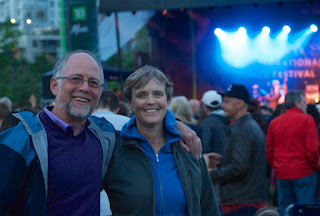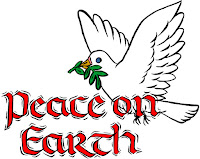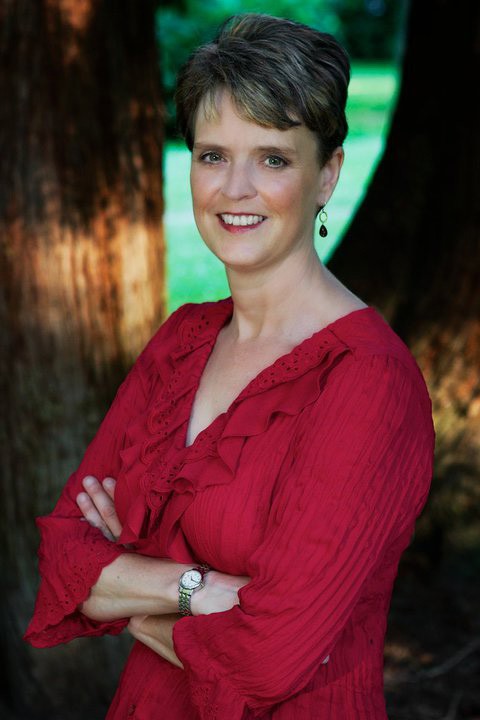Of all the things we hope for this time of year, perhaps nothing is more important than peace on earth. In that spirit, here’s a quick primer (in alphabetical order) on who celebrates what this time of year. After all, it’s only a better understanding of one another that can truly lead to peace. Happy holidays to all!
 |
|
| My husband Steve and me. Happy holidays 2016! |
Bhuddists celebrate Bodhi Day: 8 December – Day of Enlightenment, celebrating the day that the historical Buddhaexperienced enlightenment
Christians celebrate:
- Advent: fourth Sunday preceding 25 December
- Krampusnacht: 5 December – The Feast of St. Nicholas is celebrated in parts of Europe on 6 December. In Alpine countries, Saint Nicholas has a devilish companion named Krampus who punishes the bad children the night before.
- Saint Nicholas‘ Day: 6 December
- Saint Lucia’s Day: 13 December – Church Feast Day. Saint Lucia comes as a young woman with lights and sweets.
- Longest Night: A church service to help those coping with loss, usually held on the eve of the Winter solstice.
- Christmas Eve: 24 December
- Christmas Day: 25 December – one of the most celebrated holidays around the world, increasingly celebrated by Christians and non-Christians alike.
- Anastasia of Sirmium feast day: 25 December
- Twelve Days of Christmas: 25 December–6 January
- Las Posadas: 16–24 December – procession to various family lodgings for celebration & prayer and to re-enact Mary & Joseph’s journey to Bethlehem
- Saint Stephen‘s Day: 26 December
- Saint John the Evangelist‘s Day: 27 December
- Holy Innocents‘ Day: 28 December
- Saint Sylvester‘s Day: 31 December
Hindus in the U.S. celebrate:
- Pancha Ganapati: 21–25 December – modern five-day festival in honor of Lord Ganesha.
Historical enthusiasts celebrate:
- Malkh: 25 December, the birthday and the festival of the Sun, a festival dedicated to the Deela-Malkh in Vainakh mythology
- Mōdraniht: or Mothers’ Night, the Saxon winter solstice festival
- Saturnalia: the Roman winter solstice festival
- Dies Natalis Solis Invicti (Day of the birth of the Unconquered Sun): 25 December – late Roman Empire
Jews celebrate:
- Hanukkah: Ḥănukkāh is an eight-day Jewish holiday commemorating the re-dedication of the Holy Temple (the Second Temple) in Jerusalem at the time of the Maccabean Revolt against the Seleucid Empire of the 2nd century BC. Hanukkah is observed for eight nights and days, starting on the 25th day of Kislev according to the Hebrew calendar, which may occur at any time from late November to late December in the Gregorian calendar.
Pagans celebrate:
- Yule: Pagan winter festival that was celebrated by the historical Germanic people from late December to early January.
- Yalda: 21 December – The turning point, Winter Solstice. As the longest night of the year and the beginning of the lengthening of days, Shabe Yaldā or Shabe Chelle is an Iranian festival celebrating the victory of light and goodness over darkness and evil. Shabe yalda means ‘birthday eve.’ According to Persian mythology, Mithra was born at dawn on 22 December to a virgin mother. He symbolizes light, truth, goodness, strength, and friendship. Herodotus reports that this was the most important holiday of the year for contemporary Persians. In modern times Persians celebrate Yalda by staying up late or all night, a practice known as Shab Chera meaning ‘night gazing’. Fruits and nuts are eaten, especially pomegranates and watermelons, whose red color invokes the crimson hues of dawn and symbolize Mithra.
Others celebrate:
- Human Rights Day: 10 December
- Zamenhof Day: 15 December – Birthday of Ludwig Zamenhof, inventor of Esperanto; holiday reunion for Esperantists
- Soyal: 21 December – Zuni and Hopi
- HumanLight: 23 December – Humanist holiday originated by the New Jersey Humanist Network in celebration of “a Humanist’s vision of a good future.”
- Newtonmas: 25 December – As an alternative to celebrating the religious holiday Christmas, some atheists and skeptics have chosen to celebrate December 25 as Newtonmas, due to it being Isaac Newton’s birthday on the old style date.
- Quaid-e-Azam‘s Day: 25 December
- Boxing Day: 26 December – Day after Christmas.
- Kwanzaa: 26 December–1 January – Pan-African festival celebrated in the U.S.
- Watch Night: 31 December
- New Year’s Eve: 31 December – last day of the Gregorian year
- Hogmanay: night of 31 December–before dawn of 1 January – Scottish New Year’s Eve celebration
- Dongzhi Festival – a celebration of Winter
Unitarians celebrate:
Chalica: first week of December – A holiday created in 2005, celebrated by some Unitarian Universalists.


